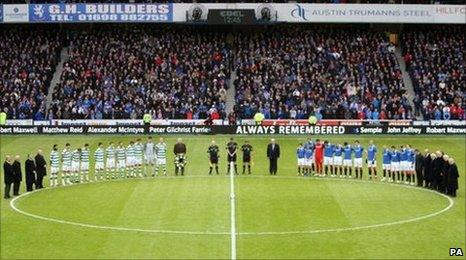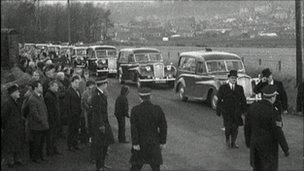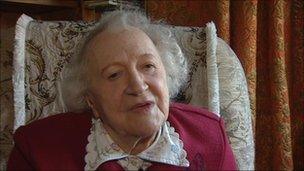One minute's silence to mark Ibrox stadium disaster
- Published

Players and fans alike fell silent for one minute to remember the 66 who died in the Ibrox stadium disaster
Fans attending the Rangers v Celtic game observed a one minute's silence in remembrance of the 1971 Ibrox stadium disaster in which 66 died.
At the end of the Old Firm derby on 2 January 40 years ago, dozens were crushed to death on a stairway near the Copland Road end of the ground.
As well as the 66 who perished, 200 others were injured in the crush.
The minute's silence was observed by both sets of fans attending the match which ended 2-0 to Celtic.
The captains of the 1971 sides, John Greig for Rangers and Billy McNeill for Celtic, led out the current Old Firm teams.
A further event to remember the dead will be held on Monday, 3 January, with a special memorial service.
At the time of the disaster it was believed that fans leaving the stadium before the final whistle, had turned back when Rangers' centre-forward Colin Stein scored an equalising goal in the 89th minute.

Players represented the club at the funerals of all the victims
But a fatal accident inquiry which heard evidence of the position in which the bodies were found, determined all of the victims had been leaving the ground.
Virtually none of the bodies showed any sign of significant injury. They had died, the inquiry decided, from asphyxiation or suffocation in the crush which left steel safety barriers buckled and broken.
Four decades later, one of the survivors, Ian Loch, recalled the horror of Stairway 13.
He said as they headed for the exits, fans were delighted with Rangers' equaliser, which came just a minute after Jimmy Johnstone had put Celtic into the lead.
But the crush was immense in the passageway and on the stairway which took fans out of the ground beyond the top of the terracing.
'No air left'
"It was like a pack of cards where someone had fallen. Everyone was just going on top of each other and, really, you were just trying to fight for your own life then," he told BBC Scotland.
"The air was just getting squeezed out of you. At first everybody could shout: 'Get back, get back.'
"But that soon fell silent because there was no air left in your lungs. You just felt it was like a vice in your body getting tighter and tighter."
He said he feared for his own safety as he felt his legs wrapped around the person behind him.
Mr Loch said he believes he was saved by his father's advice to ensure, if he was in a crush, his arms were free. He managed to pull himself up and crawl to safety over bodies.
John Greig was Rangers captain at the time of the disaster.
He had received treatment for an injury after the final whistle and was one of the last players out of the showers when officials started to bring bodies into the dressing room.
"I'll never forget that sight as long as I live," he said.
"Probably I was complaining about a wee sore ankle, and there's people who had lost their lives. It was a shocking end to a football match. An accident like that, you never expect to happen."
The Rangers manager, Willie Waddell, announced the next day the club would be represented by players at the funerals of all 66 victims.
One of the most poignant was in Markinch, in Fife, from where five teenage boys had set off from a street called Park View to go to the game - and never returned.
Gisela Easton, 86, still remembers the day her son Peter went down the street with his pals to catch the bus to Ibrox.

Gisela Easton said she blamed herself for her son's death
"I said I'll wave to you from the window," she recalled.
"And they all went along the street, the five of them, and swung their scarves and sang Rangers songs. That's the last I saw of him."
Four decades after the tragedy she blames herself for allowing Peter, who was 15, to go to Glasgow.
His father was concerned about it, but Peter had pleaded with her.
She had relented as a reward because he was doing so well at school.
"I couldn't deny him, and I persuaded my husband to let him go," Mrs Easton said.
"And I remember we stood in the kitchen, and Peter said to me 'Thanks Mum'. And it was my fault that he was killed."